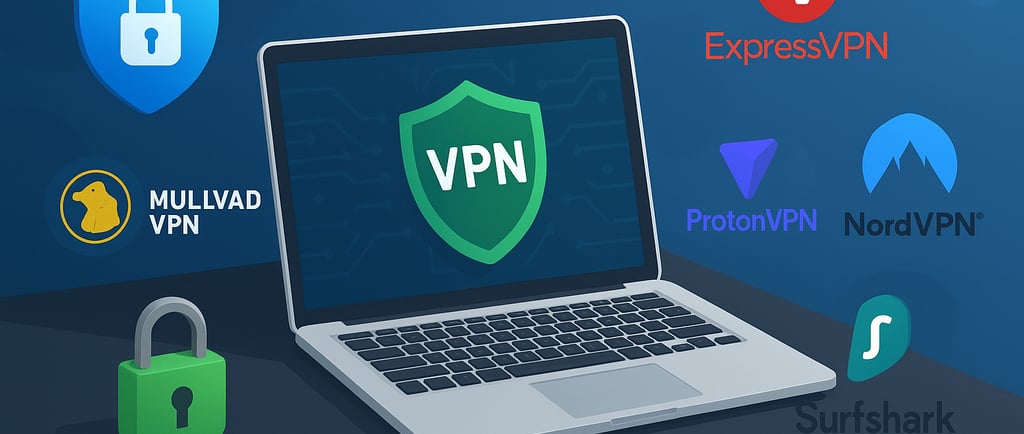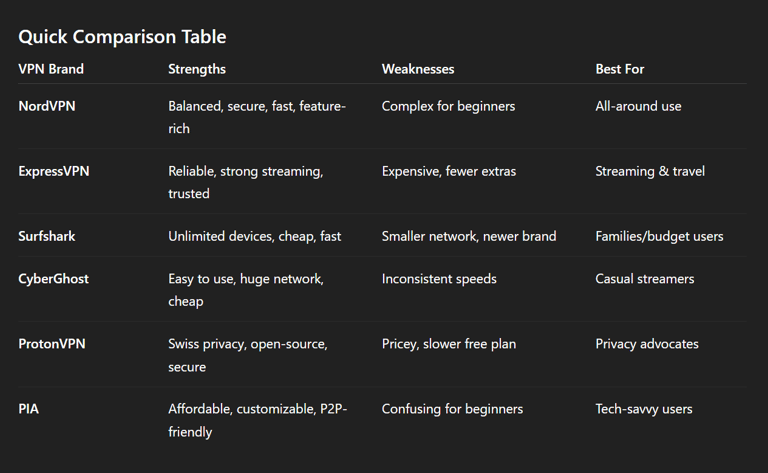The Pros and Cons of Different VPN Brands: What Each One Covers
VPN


The VPN market is crowded with dozens of providers, each promising speed, privacy, and global access. While most VPNs share the same basic functions—encrypting traffic and hiding your IP address—there are important differences in performance, pricing, and features.
In this article, we’ll review the leading VPN brands—such as NordVPN, ExpressVPN, Surfshark, CyberGhost, ProtonVPN, and Private Internet Access (PIA)—and highlight their strengths and weaknesses to help you choose the right one for your needs.
1. NordVPN
Overview:
One of the biggest names in the VPN industry, NordVPN is known for its balance of speed, security, and extra features.
Pros:
Strong Security: AES-256 encryption, Double VPN, Onion over VPN, and a built-in kill switch.
Huge Server Network: 6,500+ servers in 110+ locations.
Streaming-Friendly: Works with Netflix, Hulu, BBC iPlayer, and more.
Advanced Features: Threat Protection (blocks ads and malware), Meshnet (secure device-to-device connections).
Fast Speeds: Optimized with WireGuard-based NordLynx protocol.
Cons:
Complex Features for Beginners: Some settings can overwhelm first-time users.
Occasional Connection Drops: On certain servers, though rare.
Best For: Users who want an all-in-one VPN for streaming, privacy, and advanced security.
2. ExpressVPN
Overview:
ExpressVPN is widely considered the “premium” VPN brand, especially strong in reliability and streaming.
Pros:
Trusted Reputation: One of the most established VPNs with independent audits.
Global Coverage: Servers in 105+ countries.
Great for Streaming: Unlocks Netflix, Disney+, Hulu, Prime Video, and more.
Ease of Use: Very beginner-friendly apps.
Strong Security: AES-256 encryption, TrustedServer technology (RAM-only servers).
Cons:
Price: One of the most expensive VPNs.
Limited Advanced Features: Fewer extras like Double VPN or built-in ad blockers.
Best For: People who want premium reliability, especially for streaming and travel.
3. Surfshark
Overview:
Surfshark is a relatively new VPN that’s exploded in popularity for its value for money and unlimited device connections.
Pros:
Unlimited Devices: One subscription covers all your gadgets.
Affordable Pricing: Much cheaper than ExpressVPN or NordVPN.
Strong Security: AES-256 encryption, CleanWeb ad/malware blocker, MultiHop connections.
Fast Speeds: WireGuard protocol ensures smooth streaming and gaming.
Streaming Access: Works with Netflix, Hulu, Disney+, and more.
Cons:
Smaller Network: ~3,500 servers, fewer than Nord or CyberGhost.
Newer Provider: Doesn’t have the long track record of ExpressVPN or NordVPN.
Best For: Families or users who want a budget-friendly VPN with unlimited connections.
4. CyberGhost
Overview:
CyberGhost stands out for its user-friendly interface and dedicated streaming servers.
Pros:
Massive Server Network: Over 11,000 servers in 100+ countries.
Dedicated Servers for Streaming & Torrenting: Easy to find the right server for Netflix, BBC iPlayer, etc.
Affordable Long-Term Plans: One of the cheapest for multi-year subscriptions.
Strong Privacy Protections: No-logs policy, headquartered in Romania (privacy-friendly jurisdiction).
Cons:
Inconsistent Speeds: Some servers are slower compared to Nord or Surfshark.
Basic App Design: Lacks advanced customization options.
Best For: Casual users who want an easy-to-use, streaming-friendly VPN at a low cost.
5. ProtonVPN
Overview:
ProtonVPN comes from the creators of ProtonMail and is highly respected for its focus on privacy and open-source security.
Pros:
Strong Privacy: Swiss-based, outside EU/US jurisdiction.
Open-Source Apps: Fully transparent and independently audited.
Secure Core Servers: Multi-hop through privacy-friendly countries.
Free Plan: Generous free tier with no data limits (but limited speed/servers).
Advanced Security Features: Tor over VPN, NetShield ad-blocker.
Cons:
Premium Pricing: Paid plans are more expensive.
Slower Speeds on Free Tier: Can be frustrating for heavy users.
Best For: Privacy-focused users who value open-source, audited security and transparency.
6. Private Internet Access (PIA)
Overview:
A long-standing VPN known for customization and affordability, PIA is great for tech-savvy users.
Pros:
Massive Server Network: Tens of thousands of servers worldwide.
Highly Customizable: Control over encryption levels, ports, and protocols.
Affordable Plans: Budget-friendly long-term pricing.
Proven No-Logs Policy: Verified in multiple court cases.
Good for Torrenting: Optimized P2P servers.
Cons:
Complex for Beginners: Advanced settings can be confusing.
Streaming Performance Varies: Doesn’t always unblock Netflix or Disney+.
Best For: Experienced users who want fine-tuned control at an affordable price.
Quick Comparison Table


Final Thoughts
There is no single “best VPN” for everyone—it depends on what you value most:
For security and reliability: NordVPN or ProtonVPN.
For streaming and travel: ExpressVPN or CyberGhost.
For budget and families: Surfshark.
For customization and torrents: PIA.
By understanding the pros and cons of each VPN brand, you can pick the provider that matches your needs, whether that’s maximum privacy, streaming access, or affordability.